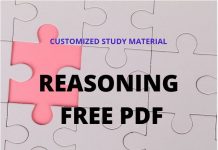Pharasal Verb Tips & Tricks Click Here
Directions (1-10): In the following questions, a part of the sentence (a word or a phrase) has been highlighted in bold. four different ways of writing the word or phrase has been given in the options (b), (c), (d) and (e). Find the correct replacement of the given bold word or phrase. If the given word or phrase is grammatically correct, then select option (a). Option (a) repeats the same word or phrase.
Q1. Carnivorous mammals can endure what would otherwise be lethal levels of body heat because they have a heat-exchange network which kept the brain from getting too hot.
(a) which kept
(b) that keeps
(c) which has kept
(d) that has been keeping
(e) having kept
Q2. The commission has directed advertisers to restrict the use of the word “natural” to foods that do not contain color or flavor additives, chemical preservatives, or nothing that has been synthesized.
(a) or nothing that has been
(b) or that has been
(c) and nothing that is
(d) or anything that has been
(e) and anything
Q3. The Iroquois were primarily planters, but supplementing their cultivation of maize, squash, and beans with fishing and hunting.
(a) but supplementing
(b) and had supplemented
(c) and even though they supplemented
(d) although they supplemented
(e) but with supplementing
Q4. As contrasted with the honeybee, the yellow jacket can sting repeatedly without dying and carries a potent venom that can cause intense pain.
(a) As contrasted with the honeybee,
(b) In contrast to the honeybee’s,
(c) Unlike the sting of the honeybee,
(d) Unlike that of the honeybee,
(e) Unlike the honeybee,
Q5. None of the attempts to specify the causes of crime explains why most of the people exposed to the alleged causes do not commit crimes and, conversely, why so many of those not so exposed have.
(a) have
(b) has
(c) shall
(d) do
(e) could
Q6. The end of the eighteenth century saw the emergence of prize-stock breeding, with individual bulls and cows receiving awards, fetching unprecedented prices, and excited enormous interest whenever they were put on show.
(a) excited
(b) it excited
(c) exciting
(d) would excite
(e) it had excited
Q7. For members of the seventeenth-century Ashanti nation in Africa, animal-hide shields with wooden frames were essential items of military equipment, a method to protect warriors against enemy arrows and spears.
(a) a method to protect
(b) as a method protecting
(c) protecting
(d) as a protection of
(e) to protect
Q8. Scientists have recently discovered what could be the largest and oldest living organism on Earth, a giant fungus that is an interwoven filigree of mushrooms and rootlike tentacles spawned by a single fertilized spore some 10,000 years ago and extending for more than 30 acres in the soil of a Michigan forest.
(a) extending
(b) extends
(c) extended
(d) it extended
(e) is extending
Q9. Quasars, at billions of light-years from Earth the most distant observable objects in the universe, believed to be the cores of galaxies in an early stage of development.
(a) believed to be
(b) are believed to be
(c) some believe them to be
(d) some believe they are
(e) it is believed that they are
Q10. Five fledgling sea eagles left their nests in western Scotland this summer, bringing to 34 the number of wild birds successfully raised since transplants from Norway began in 1975.
(a) bringing
(b) and brings
(c) and it brings
(d) and it brought
(e) and brought
Solutions
Q1. Ans.(b)
Sol. The use of the past tense (kept) is incorrect because a current situation is discussed; the present tense (keeps) is consistent with the other verbs in the sentence. In (a) and (c), which introduces a restrictive clause. Some writers follow the convention that which can only be used for nonrestrictive clauses, but insistence on this rule is controversial, and both (a) and (c) can be rejected on other grounds.
Hence, B Correct. The verb keeps indicates a current situation and is consistent with the other verbs in the sentence. The sentence is clear and concise.
Q2. Ans.(d)
Sol. The use of ‘do not’ and ‘nothing’ in the same sentence creates a double negative and reverse the intended meaning. ‘Anything’ should be used instead of ‘nothing’. Logically, a “natural” food cannot contain any prohibited ingredient, so the list of prohibited ingredients must be connected by or.
D Correct. This sentence correctly avoids a double negative and uses parallel elements.
Q3. Ans.(d)
Sol. The participle supplementing would normally be expected to modify the first clause, describing or extending its meaning, but the logic of this sentence demands a contrast, not an extension. Consequently, the second part of the sentence must be revised to emphasize the contrast properly. The logic of the sentence also argues against a construction that would set the two clauses and the importance of their content equal when they clearly should not be. The best solution is to have the main clause describe the primary activity, and a subordinate clause, although they supplemented, describe the supplementary activity.
D Correct. Using although creates a subordinate clause in this sentence and logically links that clause with the main clause; the simple past supplemented parallels the simple past were.
Q4. Ans.(e)
Sol. The intent of the sentence is to contrast the honeybee and the yellow jacket. Correct idioms for such a contrast include in contrast with x, y, in contrast to x, y; and unlike x, y. In all these idioms, x and y must be grammatically and logically parallel. As contrasted with is not a correct idiom.
E Correct. This sentence uses a correct idiom, and the honeybee is properly parallel to the yellow jacket.
Q5. Ans.(d)
Sol. The sentence compares one group of people, most of the people exposed to the alleged causes, with another group of people, so many of those not so exposed. To maintain the comparison, the verb in the second part should match the verb in the first part. Since the first verb is do not commit, the second verb should be the parallel ‘do’. There is no need to repeat commit crimes since it is understood in this construction.
D Correct. This sentence correctly uses the verb ‘do’ to complete the comparison and maintain the parallelism with ‘do not commit’.
Q6. Ans.(c)
Sol. The bulls and cows are described in a series of participial phrases. Items in a series should be parallel: receiving awards is parallel to fetching unprecedented prices, but excited must be changed to exciting to make the third phrase, exciting enormous interest, parallel to the first two.
C Correct. In this sentence, exciting is parallel to receiving the fetching.
Q7. Ans.(c)
Sol. The bold part of the sentence begins a phrase describing items of military equipment. It is awkward and inaccurate to describe items themselves as a method. Replacing the bold phrase with the participle protecting creates a modifying phrase that clearly explains the purpose of the items of military equipment.
C Correct. In this sentence, protecting properly introduced a modifying phrase revealing the purpose of the items.
Q8. Ans.(a)
Sol. The original sentence is correctly written. The giant fungus is described as an interwoven filigree spawned … some 10,000 years ago and extending for more than 30 acres. The present participle extending parallels the past participle spawned.
A Correct. This sentence has the participles spawned and extending in a correct parallel construction. Spawned refers to something that happened in the past. Which extending refers to something that continues into the present.
Q9. Ans.(b)
Sol. The original sentence is not actually a sentence; it is a sentence fragment since it lacks a verb: believed to be on its own is a participial phrase. The verb ‘are’ must be placed before ‘believed to be’ to create a complete sentence.
B Correct. The verb believed to be grammatically completes the sentence and connects quasars to cores.
Q10. Ans.(a)
Sol. ‘Bringing’ is the present participle of the verb ‘to bring’. As used here, it correctly describes an action that happens at the same time as the action in the main clause; ‘bringing’ indicates that the number of wild birds became 34 when the five eagles left their nests.
A Correct. The participle bringing correctly links the two ideas in the sentence.












